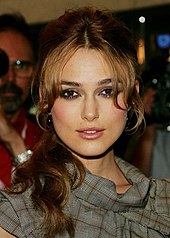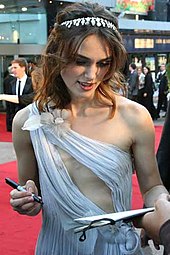Keira Knightley theme by Juan Cabot
Download: KeiraKnightley.p3t

(1 background)
Keira Knightley | |
|---|---|
 Knightley in 2011 | |
| Born | Keira Christina Knightley 26 March 1985 |
| Other names | Keira Christina Righton[1] |
| Education | |
| Occupation(s) | Actress, activist, model, singer, philanthropist |
| Years active | 1991–present |
| Works | Full list |
| Spouse | |
| Children | 2 |
| Parents |
|
| Awards | Full list |
Keira Christina Knightley OBE (/ˈkɪərə ˈnaɪtli/; born 26 March 1985) is an English actress. Known for her work in independent films and blockbusters, particularly period dramas, she has received numerous accolades, including nominations for two Academy Awards, two BAFTAs, three Golden Globes, and a Laurence Olivier Award. In 2018, she was appointed an OBE at Buckingham Palace for services to drama and charity.[2]
Born in London to actors Will Knightley and Sharman Macdonald, Knightley obtained an agent at age six and initially worked in commercials and television films. Following a minor role as Sabé in Star Wars: Episode I – The Phantom Menace (1999), her breakthrough came when she played a tomboy footballer in Bend It Like Beckham (2002) and co-starred in Love Actually (2003). She went on to achieve global recognition for playing Elizabeth Swann in the Pirates of the Caribbean film series (2003–2007, 2017).
For her portrayal of Elizabeth Bennet in Pride & Prejudice (2005), Knightley was nominated for the Academy Award for Best Actress. She starred in several more period films over the next few years, including Atonement (2007), The Duchess (2008), A Dangerous Method (2011), and Anna Karenina (2012). She then forayed into contemporary pieces, with headline parts in Seeking a Friend for the End of the World (2012), Begin Again (2013), and Jack Ryan: Shadow Recruit (2014). Knightley returned to historical films playing Joan Clarke in The Imitation Game (2014), earning a nomination for the Academy Award for Best Supporting Actress. She later starred as the title character in Colette (2018) and journalist Loretta McLaughlin in Boston Strangler (2023).
On stage, Knightley has appeared in two West End productions: The Misanthrope in 2009, which earned her an Olivier Award nomination, and The Children's Hour in 2011. She also starred as the titular heroine in the 2015 Broadway production of Thérèse Raquin. Knightley is known for her outspoken stance on social issues and has worked extensively with Amnesty International, Oxfam, and Comic Relief. She is married to musician James Righton, with whom she has two daughters.
Early life and education[edit]
Keira Christina Knightley was born on 26 March 1985 in the London suburb of Teddington, to stage actors Will Knightley and Sharman Macdonald.[3] She was meant to be named "Kiera", the anglicised form of "Kira", after the Soviet figure skater Kira Ivanova, whom her father admired; however, Macdonald misspelt the name when she registered her daughter's birth certificate, writing the e before the i.[4] Her father is English and her mother is of Scottish and Welsh descent.[5] Knightley has an older brother, Caleb.[6] Macdonald worked as a playwright after her acting career came to an end. Knightley's parents encountered substantial financial difficulties following the birth of her brother;[7] her father, a "middling" actor, agreed to a second child only if her mother sold a script first. However, her parents' varying degrees of success did not deter Knightley's curiosity about the profession.[8] Macdonald introduced her own children to theatre and ballet very early.[9] This inspired Knightley's interest in acting.[10]
Knightley attended Teddington School.[11] She was diagnosed with dyslexia at age six, but by the time she was eleven, with her parents' support, she says, "they deemed me to have got over it sufficiently". She is still a slow reader and cannot read out loud.[12] Knightley has said she was "single-minded about acting".[13] At age three, she requested to obtain an agent like her parents and secured one at six. This led to her taking a number of small parts in television dramas.[14] She acted in a number of local amateur productions, which included After Juliet, written by her mother, and United States, written by her drama teacher. Knightley began studying her A-Levels at Esher College, but left after a year to pursue an acting career.[15] Her mother's friends encouraged her to go to drama school, which she declined for financial and professional reasons.[16]
Career[edit]
1993–2002: Career beginnings and breakthrough[edit]

After obtaining an agent at age six, Knightley began working in commercials and small television roles. Her first onscreen appearance was in the 1993 Screen One television episode titled "Royal Celebration". She then played Natasha Jordan, a young girl whose mother is involved in an extramarital affair, in the romantic drama A Village Affair (1995). After appearing in a spate of television films through the mid-to-late 1990s, including Innocent Lies (1995), The Treasure Seekers (1996), Coming Home (1998), and Oliver Twist (1999),[17] Knightley landed the role of Sabé, Padmé Amidala's handmaiden and decoy, in the 1999 science fiction blockbuster Star Wars: Episode I – The Phantom Menace. Her dialogue was dubbed over by Natalie Portman, who played Padmé. Knightley was cast in the role because of her close resemblance to Portman; even the two actresses' mothers had difficulty telling their daughters apart when they were in full make-up.[18]
In her first major role, the 2001 Walt Disney Productions television film Princess of Thieves, Knightley played the daughter of Robin Hood. In preparation for the part, she trained for several weeks in archery, fencing, and riding.[19] Concurrently, she appeared in The Hole, a thriller that received a direct-to-video release in the US. The film's director Nick Hamm described her as "a young version of Julie Christie".[20] Knightley also took on the role of Lara Antipova in the 2002 miniseries adaptation of Doctor Zhivago, to positive reviews and high ratings.[21] In the same year, Knightley starred as a pregnant drug addict in Gillies MacKinnon's drama film Pure. Co-starring Molly Parker and Harry Eden, the film had its world premiere at the 2002 Toronto International Film Festival.[22] In a retrospect review for AboutFilm.com, Carlo Cavagna noted Knightley's screen presence and wrote that "[although Knightley] doesn't have half of Parker's ability [...] she has spunk and grit [and] shines brightly in Pure".[23]
Knightley landed a breakthrough role when she starred in Gurinder Chadha's sports comedy film Bend It Like Beckham, which was a box office hit in the U.K and U.S.[24] Knightley portrayed Jules, a tomboy football player struggling against social norms who convinces her friend to pursue the sport.[25] The film surprised critics who were laudatory of its "charming" and "inspiring" nature, social context and the cast's performances.[26] Knightley and her co-star Parminder Nagra attracted international attention for their performances;[27] critic James Berardinelli, who was largely laudatory of the film and the "energetic and likable" cast, noted that Knightley and Nagra brought "a lot of spirit to their instantly likable characters".[28] To prepare for their roles, they underwent three months of extensive football training under the English football coach Simon Clifford. Knightley was initially sceptical of the project: in an interview with Tracy Smith she said, "I remember telling friends I was doing this girls' soccer movie [...] And nobody thought that it was gonna be any good."[29]
2003–2007: Pirates of the Caribbean and worldwide recognition[edit]
Knightley portrayed the role of Elizabeth Swann, in the 2003 American fantasy swashbuckler film Pirates of the Caribbean: The Curse of the Black Pearl.[30] The film, based on the Disney theme park attraction, revolves around infamous buccaneer Jack Sparrow and blacksmith Will Turner rescuing Swann, in possession of a cursed golden medallion, from 18th-century pirates.[31] The producers Jerry Bruckheimer and Gore Verbinski cast Knightley for her "indescribable quality [...] reminiscent of motion picture stars from Hollywood's heyday."[32] Knightley underestimated the stunt work required and believed she would primarily be sitting in carriages; at one point during filming, she stood for two days on a plank and rejected a stunt double's offer to jump off the platform for the scene.[32][33] Despite boasting the names of stars like Johnny Depp and Orlando Bloom and a $135 million budget, Pirates was expected to fail at the box office.[34] Knightley herself was not optimistic about its prospects.[35] The film opened at number one on the box office, and became one of the highest-grossing releases of the year, with worldwide revenues of $654 million.[36] Elvis Mitchell of The New York Times likened Knightley's "strident and confident" physical assurance to that of Nicole Kidman, while Keith Phipps of The A.V. Club branded her and Bloom as appealing leads.[37][38]
Also in 2003, Knightley appeared in Richard Curtis's Christmas-themed romantic comedy Love Actually, featuring an ensemble cast, which included her childhood idol Emma Thompson.[39][40] Knightley played Juliet, a woman whose fiancée's best man is secretly in love with her.[41] Peter Travers of Rolling Stone criticised the waste of Knightley's talent in a "nothing" role,[42] while Megan Conner of The Guardian remarked that the film turned Knightley into a household name.[16] Love Actually has been referred to as a modern-day Christmas classic.[43] Knightley believes the film's trajectory to be "extraordinary", given that its popularity resurfaced a few years after the film's release.[44] Knightley's only release of 2004 was the historical film King Arthur, where she played Guinevere, a warrior queen and the wife of the titular character.[45] The part required her to learn boxing, archery, and riding.[39][46] The critic A. O. Scott praised Knightley for "throw[ing] herself bodily into every scene".[47] Although the film received unfavourable reviews, Knightley's stature as a performer grew; she was voted by the readers of Hello magazine as the industry's most promising teen star,[48] and featured in Time magazine's article, which stated that she seemed dedicated to develop herself as a serious actor rather than a film star.[49]

Knightley appeared in three films in 2005, the first of which was the psychological thriller The Jacket, co-starring Adrien Brody.[50] In a mixed review for Empire, Kim Newman wrote that the role was unlike the ones she had previously taken up : "getting out of period gear and talking American, tries to broaden her range and is arguably well-cast".[51] Knightley next played the titular character in Tony Scott's French-American action film Domino, based on the life of Domino Harvey. The film's release was delayed on several occasions and, on its eventual release in November, it received negative reviews and performed poorly at the box office.[52]
Knightley's most successful release of the year was Pride & Prejudice, a period drama based on Jane Austen's novel Pride and Prejudice.[53] The director Joe Wright cast Knightley for her tomboyish nature combined with a "lively mind" and sense of humour.[54] Knightley, who had admired the book from a young age,[55] said of her character, "The beauty of Elizabeth is that every woman who ever reads the book seems to recognise herself, with all her faults and imperfections."[55] On release, the film became a huge commercial success, with total collections of around US$120 million worldwide, and received positive reviews from critics.[56] Writing for The Guardian, Peter Bradshaw labelled her performance of "beauty, delicacy, spirit and wit; in her growing lustre and confidence" and Derek Elley of Variety found her "luminous strength" to be reminiscent of a young Audrey Hepburn.[57][58] Knightley earned "Best Actress in a Leading Role" nominations at the Golden Globes and the Academy Awards for her performance at age 20, becoming the third-youngest nominee for the latter.[59] Knightley's consecutive successes came with increased media scrutiny, and she later admitted to experiencing struggles with her mental health during this period.[60]

Knightley was invited to join the Academy of Motion Picture Arts and Sciences, among other artists in 2006.[61] In 2004, the second and third films of the Pirates of the Caribbean series were conceived, with screenwriters Ted Elliott and Terry Rossio developing a story arc that would span both sequels, in which Knightley reprised her role as Elizabeth Swann. The plot of the films see Swann buck convention to seek adventure and become fierce pirate and fighter to match the skills of Sparrow and her love interest, Turner.[62] The sequel installments allowed Knightley to study sword-fighting, which she had sought to do since the first film.[32] Filming for the projects took place in 2005; Pirates of the Caribbean: Dead Man's Chest released in July 2006, with the worldwide collections of $1.066 billion, becoming the biggest financial hit of Knightley's career.[63] The third installment in the series, Pirates of the Caribbean: At World's End, was released in May, the following year.[64] A. O Scott termed her performance "a vision of imperial British pluckiness, with an intriguing dash of romantic recklessness that surfaces toward the end".[65] On November 2006, it was reported that Knightley didn't want to participate in any further sequels.[66] By 2010, both Knightley and Orlando Bloom had repeatedly been quoted in saying they wanted to move on.[67][68][69]
Knightley's continued association with period dramas yielded varying results, as seen with two of her 2007 releases, François Girard's Silk, and Joe Wright's Atonement, the feature film adaptations of the novels by Alessandro Baricco and Ian McEwan respectively.[70] The former project failed at the box office, while the latter became a critical and commercial success. Knightley played Cecilia Tallis, the elder of the two Tallis sisters, who struggles with a wartime romance with her love interest, played by James McAvoy.[71] She admitted that the pacing on the smaller, more intimate film was an adjustment compared to the Pirates franchise.[72] In preparing for the film, Knightley studied the novel as well as the "naturalism" of the performance as seen in films from the 1930s and 1940s, such as In Which We Serve (1942) and Brief Encounter (1945).[73][72] She admired the multi-layered and "fascinating" nature of her character's behaviour.[74] Knightley's performance won the Empire Award for Best Actress,[75] and earned her nominations for the BAFTA and the Golden Globes awards, also in the leading actress categories.[76] The critic Richard Roeper, who thought the lead duo were "superb" in their respective roles, was puzzled by their failure to receive Academy Award nominations.[77] The green dress worn by Knightley during the film's climactic scene garnered substantive press attention, and was subsequently regarded as one of the greatest costumes in film history.[78][79][80]
2008–2013: Independent films and stage work[edit]
Knightley appeared alongside Sienna Miller, Cillian Murphy, and Matthew Rhys in John Maybury's 2008 wartime drama The Edge of Love. The film had her play the role of Vera Phillips, a childhood friend of Welsh poet Dylan Thomas and his wife Caitlin Macnamara. Knightley wrote the script with her mother, Sharman Macdonald, with Macnamara in mind.[81] After Knightley signed on, her character's role was increased with the film focusing on her romance with a British soldier.[81] Knightley connected to Vera's quietness, and described her as "tragic and beautiful".[81] She based her performance on Marlene Dietrich, and was to mime to her prerecorded voice, before being told by Maybury to sing live. Knightley initially felt embarrassed to do so, saying she "[shook] like a leaf" but eventually went through with the plan.[81] Upon release, the film became a moderate critical and commercial success.[82] Knightley's performance and singing abilities were praised;The Independent noted that Knightley "gives Vera an independence and complexity that's aeons ahead", while the Los Angeles Times wrote "the film belongs to the women, with Knightley going from strength to strength (and showing she can sing!)".[83]

Knightley then starred as the 18th-century English aristocrat Georgiana Cavendish, Duchess of Devonshire in Saul Dibb's period drama The Duchess (2008), based on the best-selling biographical novel, Georgiana, Duchess of Devonshire by Amanda Foreman.[84] The film tells the story of Georgiana's rise in society as a sociopolitical tastemaker after her marriage disintegrates.[85] The script Knightley was sent was covered in "huge white ostrich feathers" and a gold ribbon.[86] Gabrielle Tana, the film's producer, stated Knightley "brought an instinctive understanding" of such aspects of Georgiana's life as a celebrity from her own experiences.[87] Knightley was attracted to her character's strength and status as a political influence and fashion prowess, while being inwardly vulnerable and isolated.[86] Simon Crooke of Empire described her performance as "an enigmatic, free-spirited turn and a role she'll be remembered for, probably her best role to date in a film not directed by Joe Wright."[88] The following year, she was nominated for a British Independent Film Award for Best Actress.[89] A film adaptation of William Shakespeare's tragedy King Lear set to star Knightley and Anthony Hopkins was cancelled due to recession.[90]
Knightley made her West End debut with Martin Crimp's version of Molière's comedy The Misanthrope. Starring Knightley, Damian Lewis, Tara Fitzgerald, and Dominic Rowan, the play was staged at the Comedy Theatre in December 2009. She portrayed Jennifer, a shallow, amorous, and vulnerable American film star who is courted by an analytical and veracious playwright.[91] Knightley chose the role as she felt that "if I don't do theatre right now, I think I'm going to start being too terrified to do it" and described the production as an "extraordinary and incredibly fulfilling" experience, she was sceptical of her performance.[92] Paul Taylor of The Independent remarked that Knightley was "not only strikingly convincing, but, at times, rather thrilling in its satiric aplomb".[93] However, The Guardian's Michael Billington noted that due to the nature of the role, "one could say that she is not unduly stretched".[94] In recognition of her theatre debut, Knightley was nominated for the Laurence Olivier Award for Best Actress in a Supporting Role and an Evening Standard Award.[95]
Knightley began the new decade with three films; she remarked that her work during this period helped her "empathise with people or with situations that I don't necessarily find it easy to empathise with".[96] Two of the productions, Massy Tadjedin's romantic drama Last Night and Will
